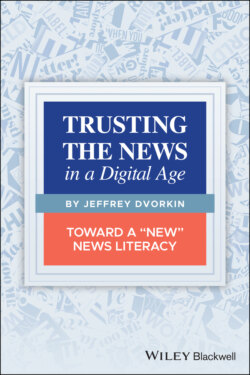Читать книгу Trusting the News in a Digital Age - Jeffrey Dvorkin - Страница 13
The Promises and Dangers of the Internet
ОглавлениеThat's because of this relatively new invention, called the Internet – the global network of networks that is accessed via the World Wide Web.
It is hard to imagine a time when we were not as closely‐linked to all things online as we are now. The rapid changes in the digital world are constant, and we need to develop a good grasp of what is bombarding us on a moment‐by‐moment basis. Essential in this process is a more nimble (and more water‐proof) craft to help us navigate these informational rapids!
In fact, it wasn't until US President George W. Bush left office in 2008 and President Barack Obama took office that the informational landscape was shaken up and changed forever by the arrival of mobile applications – known as “apps” – like Facebook, Twitter, and Snapchat. Apps are downloadable programs designed originally for use on mobile phones.
Email once seemed like the ultimate and essential communication platform when it burst onto the scene in the mid‐1990s. But it is now, for many people, completely outmoded. Younger media consumers prefer to text using completely different platforms and apps, thus avoiding email entirely.
As a result of this digital transfusion, we are now in an era where we may try our best to stay tuned into, keep on top of, and make sense of the world. But this often eludes many of us. Our feeble attempts to know what's going on at all times has been compared to trying to take a sip of water from a fire hose! There is even an acronym for this state of “information anxiety”: FOMO – fear of missing out!
Complicating this is the insertion of an inevitable commercial presence into the Internet. Opportunities for monetizing the Internet abound. Digital giants such as the “Big Five” – Facebook, Apple, Amazon, Microsoft, and Google – are now able to keep tabs on what we view, download, and share. Any time we download another app or computer game or order something online, the server on whose site we are doing this knows what we have done. That information is harvested and sold to others who want to know what interests us. We will look more closely at the influence of the “Big Five” in Chapter 8.
We are complicit in this, in part because we have little choice. We want access to the information. But in clicking “I agree” on a site, we surrender and tacitly agree to give to these giants knowledge about ourselves, along with our buying and viewing habits, in exchange for access to the Web. This information is known as metadata.
This metadata is efficiently gathered and analyzed by tech companies. It allows the companies to track our patterns so that our digital lives become known, even transparent. This information can be sold or shared with other commercial and governmental interests – so our presence on the Web now has monetary value. It is another nail in the coffin of the concept of a private life. Every time we go online, send a message, or purchase something on the Internet, there is a media organization that knows all about us, our needs, and our presence in the marketplace. For most people, this seems like a reasonable exchange. So far. But increasingly, doubts are emerging, and the role of these giant Internet companies is being questioned, especially by European regulators.
This is becoming a more complicated bargain for many people: is it worth allowing Google to know what we do online in exchange for having a Gmail account? Most people would still say “yes.” Others are increasingly questioning whether we have traded away too much. But the Internet cannot be “un‐invented,” and we need to learn to use our access to information wisely.
That is another aspect of news literacy.
